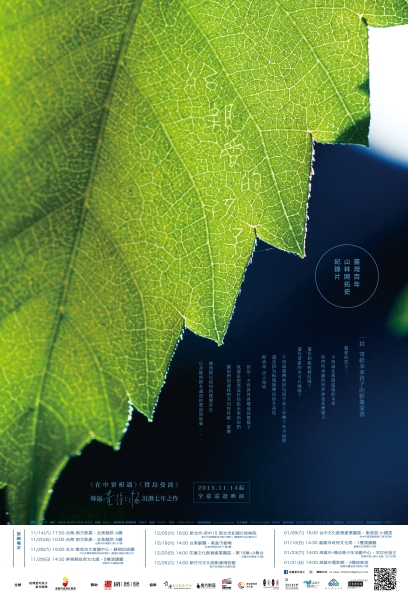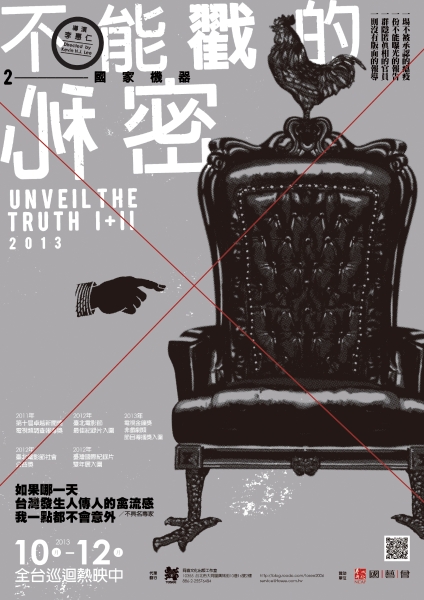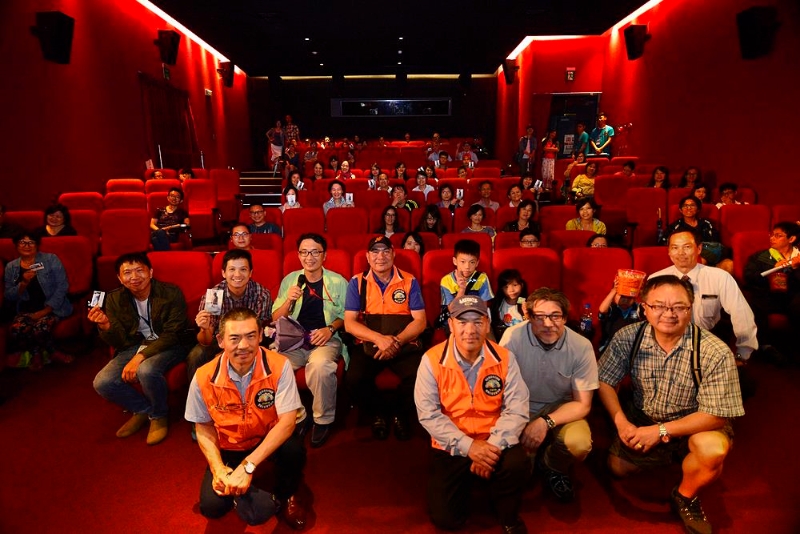"Going to the cinema" has long been dominated by consumerism as a form of entertainment and has become a formal way of watching films. However, when we think about it, a considerable amount of resources and budget need to be invested to release a movie in the cinemas actually, such as publicity, scheduling, high-quality audio-visuals, and even theater rental. This is not an easy feat for documentaries or independent films.
The formation of a "film culture" actually relies on a diversity of advances and pluralism, in which film festivals and competitions/awards play an important role, allowing space for different tastes or subjects. The production team needs to develop their own path towards screening in order to break away from these more conventional systems and find alternative methods that are more in line with the nature of their work, so that it remains conducive to dialogue and communication. The NCAF "Audio / Video Arts" grants provide funding for screening and are an important resource to support the development of cultural diversity in cinema.
In particular, for documentaries based on the real world, how to provide social commentary, to bring about change or deeper communication, is something that many filmmakers are constantly thinking about. For example, in the 1990s, the Full Shot Communication Foundation, a documentary organization, advocated that "documentaries should serve as feedback to people's daily life and their living places". They also organized several local documentary screenings to express social concern through documentary filming and screening.
This tradition of Taiwanese documentary filming and screening has been carried on by many directors. For example, film director Shu-Mei Huang, a former member of Full Shot Communication Foundation, has been working on local stories and centered on environmental issues for a long time. In 2015, she made a documentary on the 100-year history of mountain and forest development in Taiwan, A Letter to Future Children; a nationwide tour of screenings and seminars was also held at the Pingtung County Government building, Taitung Black Box Theater, and Hualien Cultural and Creative Industries Park. In 2017, she documented the campaign of villagers and environmental groups in Lingnan Village, Dongshan District, Tainan to fight against the Yongyang Business Waste Landfill site, making the film A Fight For My Hometown. They toured across the Anti-Matoushan Business Waste Landfill Association in Qishan District, Kaohsiung; Protect Tsengwen River Alliance in Yujing District, Tainan; Anti-Ou Hsin Business Waste Alliance in Niupu Village, Longqi District, Tainan; and Golden Chimney Cultural Promotion Association in Dalinpu, Kaohsiung. Through post-screening discussions over a long period of time, they practiced the cinematic ideal of "filming is action, action is power".
In a similar vein, there were also the screening tour of Unveil the Truth 2013 by director Kevin H.J. Lee, and the screening and discussion tour of See You, Loveable Strangers by Vietnamese director Kim Hồng Nguyễn and Taiwanese director Tsung-Lung Tsai. The venues they chose were mainly independent bookstores, schools, and regular art/performance spaces. The directors were present at each screening and took the stage to exchange ideas with the audience in a solid, progressive dialogue. This also enabled them to obtain first-hand feedback and valuable lessons.
The film The Lost Sea, directed by Chun-Hsiu Hung, which discusses the impact of human political and economic activities on the habitat of horseshoe crabs; director Li-Shao Lee's Southland Soldiers, Boundary Revelation, and Stranger in the Mountains, which make up the Yunnan-Burma Border Guerrillas trilogy; director Singing Chen's The Moving Tent, a documentary on the Taiwan Haibizi tent theater troupe; and Taiwan Women's Film Association's I Am a Woman, I Make Films—2018 Taiwan Women Directors' National Film Promotion Screening Project all received great acclaim after their respective tours. More invitations ensued, extending and expanding the life of the films.
Unlike the commercial theater mechanism, the documentary screening tour emphasizes critical thinking, communication, and dialogue. It is more like the slow sowing of seeds and tilling of the land, taking place over a long period of time. The process accomplishes a necessary film-watching experience that is so important for the building of culture.
The formation of a "film culture" actually relies on a diversity of advances and pluralism, in which film festivals and competitions/awards play an important role, allowing space for different tastes or subjects. The production team needs to develop their own path towards screening in order to break away from these more conventional systems and find alternative methods that are more in line with the nature of their work, so that it remains conducive to dialogue and communication. The NCAF "Audio / Video Arts" grants provide funding for screening and are an important resource to support the development of cultural diversity in cinema.
In particular, for documentaries based on the real world, how to provide social commentary, to bring about change or deeper communication, is something that many filmmakers are constantly thinking about. For example, in the 1990s, the Full Shot Communication Foundation, a documentary organization, advocated that "documentaries should serve as feedback to people's daily life and their living places". They also organized several local documentary screenings to express social concern through documentary filming and screening.
This tradition of Taiwanese documentary filming and screening has been carried on by many directors. For example, film director Shu-Mei Huang, a former member of Full Shot Communication Foundation, has been working on local stories and centered on environmental issues for a long time. In 2015, she made a documentary on the 100-year history of mountain and forest development in Taiwan, A Letter to Future Children; a nationwide tour of screenings and seminars was also held at the Pingtung County Government building, Taitung Black Box Theater, and Hualien Cultural and Creative Industries Park. In 2017, she documented the campaign of villagers and environmental groups in Lingnan Village, Dongshan District, Tainan to fight against the Yongyang Business Waste Landfill site, making the film A Fight For My Hometown. They toured across the Anti-Matoushan Business Waste Landfill Association in Qishan District, Kaohsiung; Protect Tsengwen River Alliance in Yujing District, Tainan; Anti-Ou Hsin Business Waste Alliance in Niupu Village, Longqi District, Tainan; and Golden Chimney Cultural Promotion Association in Dalinpu, Kaohsiung. Through post-screening discussions over a long period of time, they practiced the cinematic ideal of "filming is action, action is power".
In a similar vein, there were also the screening tour of Unveil the Truth 2013 by director Kevin H.J. Lee, and the screening and discussion tour of See You, Loveable Strangers by Vietnamese director Kim Hồng Nguyễn and Taiwanese director Tsung-Lung Tsai. The venues they chose were mainly independent bookstores, schools, and regular art/performance spaces. The directors were present at each screening and took the stage to exchange ideas with the audience in a solid, progressive dialogue. This also enabled them to obtain first-hand feedback and valuable lessons.
The film The Lost Sea, directed by Chun-Hsiu Hung, which discusses the impact of human political and economic activities on the habitat of horseshoe crabs; director Li-Shao Lee's Southland Soldiers, Boundary Revelation, and Stranger in the Mountains, which make up the Yunnan-Burma Border Guerrillas trilogy; director Singing Chen's The Moving Tent, a documentary on the Taiwan Haibizi tent theater troupe; and Taiwan Women's Film Association's I Am a Woman, I Make Films—2018 Taiwan Women Directors' National Film Promotion Screening Project all received great acclaim after their respective tours. More invitations ensued, extending and expanding the life of the films.
Unlike the commercial theater mechanism, the documentary screening tour emphasizes critical thinking, communication, and dialogue. It is more like the slow sowing of seeds and tilling of the land, taking place over a long period of time. The process accomplishes a necessary film-watching experience that is so important for the building of culture.
Further Readings:
- Screening Is My Social Movement—Director Shu-Mei Huang's Touring Method
http://docworker.blogspot.com/2021/11/blog-post.html - The Internet as a Medium of Resistance to Power—Kevin H.J. Lee's Online Documentary Screening Experience
http://docworker.blogspot.com/2021/11/blog-post_25.html - The Lost Sea Documentary Screening and Post-Screening Discussion@Hoanya Bookstore, Chun-Hsiu Hung 2015
https://www.youtube.com/watch?v=tZG62mQ5aD4 - See You, Loveable Strangers—Kim Hồng Nguyễn and Tsung-Lung Tsai Document the Plight of Migrant Workers
https://mag.ncafroc.org.tw/article_detail.html?id=297ef7227039739d01707a92427c0038 - Exile and Homecoming: A Memory Check of the Yunnan-Burma Border Guerrillas Trilogy
https://mag.ncafroc.org.tw/article_detail.html?id=297ef722707b8a0401709e738bd0003a - Documenting as Confrontation—On Shu-Mei Huang's A Fight For My Hometown
https://mag.ncafroc.org.tw/article_detail.html?id=297ef7227039739d01707a221e450027
*Translator: Linguitronics












